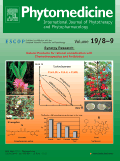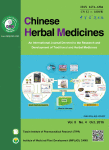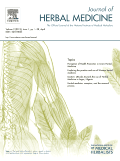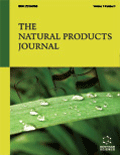
PHYTOMEDICINE
Scope & Guideline
Elevating Pharmacology through Plant Insights
Introduction
Aims and Scopes
- Pharmacological evaluation of medicinal plants:
Research articles often focus on the pharmacological properties of various plants, exploring their potential therapeutic applications in treating diseases such as cancer, diabetes, and infections. - Phytochemical analysis and characterization:
The journal publishes studies that analyze the chemical constituents of plants, providing insights into their bioactive compounds, which are crucial for understanding their medicinal value. - Traditional medicine and ethnobotany:
A significant focus is on traditional uses of plants in various cultures, integrating ethnobotanical knowledge with scientific inquiry to validate and enhance traditional remedies. - Nutraceuticals and functional foods:
Articles often explore the nutritional benefits of plants, including their role in functional foods, thereby addressing both health and dietary aspects of plant-based therapies. - Innovative drug delivery systems:
Research on novel formulations and delivery systems for phytochemicals, including nanoformulations and herbal excipients, highlights the journal's commitment to advancing phytomedicine.
Trending and Emerging
- Research on COVID-19 and herbal remedies:
A surge in studies exploring the potential of medicinal plants in combating COVID-19 reflects a timely response to global health crises, highlighting the relevance of phytomedicine in contemporary research. - Nanotechnology in phytomedicine:
There is an increasing trend towards the application of nanotechnology in enhancing the efficacy and delivery of phytochemicals, indicating a growing interest in innovative drug delivery systems. - Sustainability and eco-friendly practices:
Emerging studies focus on sustainable practices in the cultivation and utilization of medicinal plants, emphasizing the importance of environmental stewardship in phytomedicine. - Integrative approaches combining traditional and modern medicine:
A notable trend is the exploration of integrative health approaches that combine traditional herbal medicine with modern scientific practices, promoting holistic health solutions. - Focus on chronic diseases and lifestyle-related conditions:
Research addressing chronic diseases such as obesity, diabetes, and cardiovascular issues is increasingly prominent, reflecting a growing concern for lifestyle-related health problems.
Declining or Waning
- Conventional pharmaceutical comparisons:
There has been a noticeable decrease in studies that primarily compare traditional herbal remedies with synthetic pharmaceuticals, as the focus shifts towards integrative approaches and the synergistic effects of herbal and conventional medicines. - Basic ethnobotanical surveys:
Research focused solely on basic ethnobotanical surveys without accompanying pharmacological validation has declined, indicating a move towards more rigorous scientific methodologies. - Studies with limited scope:
There is a waning interest in publications that solely focus on specific local medicinal plants without broader implications or innovative methodologies, as researchers are increasingly looking for globally relevant findings.
Similar Journals

Chinese Herbal Medicines
Leading the Way in Herbal Research and ApplicationsChinese Herbal Medicines, published by Elsevier Singapore Pte Ltd, is a distinguished journal dedicated to the exploration and advancement of research in the fields of Complementary and Alternative Medicine and Pharmacology. Since its transition to Open Access in 2020, the journal has significantly broadened its reach, facilitating the dissemination of valuable knowledge to researchers, practitioners, and academics worldwide. With an impressive Q1 ranking in Complementary and Alternative Medicine and a notable Q2 ranking in both Pharmacology categories for 2023, it is recognized for its impactful contributions to the understanding of herbal treatments and their therapeutic applications. Situated in The Netherlands and numerically indexed under ISSN: 1674-6384, the journal aims to provide a platform for innovative studies, analytical reviews, and clinical research that explore the efficacy, safety, and socio-economic factors associated with herbal medicines. The HIndex reflects its growing influence in the scientific community, while Scopus rankings position the journal favorably within its respective fields, making it a vital resource for any serious scholar engaged in herbal medicine studies.

Journal of Herbal Medicine
Integrating Tradition and Innovation for Healthier FuturesThe Journal of Herbal Medicine, published by Elsevier GmbH in Germany, stands at the forefront of research in the dynamic and evolving field of complementary and alternative medicine. With an ISSN of 2210-8033 and an E-ISSN of 2210-8041, this journal has been contributing significant insights since its inception in 2011 and continues to be a vital resource through 2024. Recognized for its scholarly rigor, it holds a commendable Q2 ranking in the 2023 Scopus category for Complementary and Alternative Medicine, placing it in the upper echelons of its field with a rank of 32 out of 105 journals, marking it in the 70th percentile. The Journal of Herbal Medicine emphasizes the integration of traditional herbal therapies and modern scientific approaches, offering researchers, professionals, and students a platform for disseminating their findings and fostering an inclusive dialogue on natural medicine's role in healthcare. Although it is not an open-access publication, its commitment to high-quality research makes it an essential read for those wanting to explore the efficacy and application of herbal medicine in contemporary practice.

Annals of Phytomedicine-An International Journal
Fostering Global Dialogue on Medicinal PlantsAnnals of Phytomedicine - An International Journal is a leading publication dedicated to the exploration and advancement of phytomedicine, broadly encompassing research on medicinal plants, their bioactive compounds, and therapeutic applications. Published by UKAAZ Publications, this journal seeks to bridge the gap between traditional and modern medicinal practices, offering a platform for researchers, professionals, and students passionate about herbal therapies and their efficacy. With an ISSN 2393-9885 and E-ISSN 2278-9839, the journal adheres to stringent peer-review protocols to ensure the publication of high-quality research. Fostering open access to knowledge in a rapidly evolving field, Annals of Phytomedicine serves as an essential resource, promoting innovative findings and comprehensive reviews that drive the global discourse on phytotherapy. By engaging with this journal, readers can stay informed about the latest advancements, contributing significantly to the scholarly community and beyond.

Advances in Traditional Medicine
Innovating the Future of Herbal WisdomAdvances in Traditional Medicine, published by SPRINGER, stands at the forefront of the Complementary and Alternative Medicine field, dedicated to exploring the intricate landscapes of traditional medical practices worldwide. With an impressive 2023 Q2 ranking and a Scopus rank of #30/105, this journal is committed to advancing scholarly discourse and innovation in the study and practice of traditional medicine, making it an essential resource for researchers, practitioners, and students alike. As an Open Access journal, it ensures wide accessibility to cutting-edge research and developments from 2020 to 2024, fostering collaboration and knowledge exchange in the global medical community. Based in Singapore, with operations linked to VAN GODEWIJCKSTRAAT 30, 3311 GZ Dordrecht, Netherlands, this journal not only enhances its reach but also enriches the academic landscape with its significant contributions to understanding the role of traditional medicine in contemporary healthcare.

Marine Drugs
Diving Deep into Marine Biotechnology and PharmacologyMarine Drugs is a leading peer-reviewed journal dedicated to the field of drug discovery and development derived from marine resources. Published by MDPI in Switzerland since 2003, this open-access journal has established itself as a prominent platform for the dissemination of high-quality research, evidenced by its Q1 rankings in 2023 across multiple categories including Drug Discovery, Pharmaceutical Science, and Pharmacology, Toxicology, and Pharmaceutics. With a global readership, Marine Drugs specializes in the exploration of bioactive compounds from marine organisms, advancing our understanding of natural product chemistry and its applications in pharmacology and therapeutics. The journal actively encourages submissions from researchers worldwide, showcasing innovative studies, reviews, and methodologies that contribute to the growing field of marine biotechnology. Researchers, professionals, and students alike will find Marine Drugs an invaluable resource for enhancing their knowledge and fostering collaborations in marine drug research.

TROPICAL JOURNAL OF PHARMACEUTICAL RESEARCH
Championing open access to vital pharmaceutical knowledge.Tropical Journal of Pharmaceutical Research is an esteemed open-access platform dedicated to advancing the field of pharmaceutical sciences, published by the Pharmacotherapy Group in Nigeria. With an ISSN of 1596-5996 and open access established since 2002, this journal serves as a critical resource for researchers, professionals, and students seeking to disseminate and access high-quality research in both pharmaceutical science and pharmacology. Despite its ranking in the third quartile (Q3) for Pharmaceutical Science and the fourth quartile (Q4) in Pharmacology as of 2023, the journal continues to stand out with its commitment to fostering significant dialogue and innovation in the scientific community. Anchored at the University of Benin, Faculty of Pharmacy, the journal invites contributions that explore novel pharmaceutical research, clinical applications, and drug development, playing a vital role in addressing health challenges that are particularly relevant to tropical regions. Researchers can look forward to publishing their findings in a journal that not only promotes the sharing of knowledge but also enhances the scientific discourse within a rapidly evolving field.

Avicenna Journal of Phytomedicine
Unveiling Nature's Healing SecretsAvicenna Journal of Phytomedicine, published by Mashhad University of Medical Sciences, is a premier Open Access journal dedicated to advancing the field of phytomedicine. Established in 2011, this journal aims to promote research on the therapeutic potentials of medicinal plants, integrating traditional knowledge with modern pharmacological insights. With an ISSN of 2228-7930 and an E-ISSN of 2228-7949, it has garnered significant attention in the research community, achieving a Q2 ranking in Complementary and Alternative Medicine and a Q3 ranking in Drug Discovery as of 2023. Its Scopus rankings affirm the journal's relevance, with the journal positioned at 37 out of 105 in its category, reflecting a 65th percentile. The Avicenna Journal of Phytomedicine serves as an invaluable resource for researchers, professionals, and students seeking to explore innovative botanical therapies, making it a notable platform for disseminating high-quality research in this burgeoning field.

Natural Product Communications
Harnessing the Power of Plants for Modern MedicineNatural Product Communications is an esteemed open-access journal published by SAGE Publications Inc, dedicated to the exploration and dissemination of knowledge concerning natural products in diverse fields, including Complementary and Alternative Medicine, Drug Discovery, and Pharmacology. Since its inception in 2006 and continuing through its converged years until 2024, the journal has gained recognition with a robust focus on plant science and the medicinal properties of natural products. With a commendable impact factor reflected in its category quartiles (Q3 across key domains), Natural Product Communications serves as a vital resource for researchers and professionals who aim to further the understanding of the therapeutic potential of natural compounds. As an open-access journal since 2020, it ensures wide accessibility to its published research, thereby facilitating collaboration and innovation within the scientific community. This commitment to excellence makes Natural Product Communications a crucial platform for advancing research in the holistic and pharmacological sciences.

Natural Products Journal
Illuminating the Path of Natural Products in Modern MedicineNatural Products Journal, a leading publication by Bentham Science Publishers, primarily focuses on the rapidly evolving field of Natural Products and their applications in Complementary and Alternative Medicine as well as Drug Discovery. With an ISSN of 2210-3155 and an E-ISSN of 2210-3163, this journal serves as an essential platform for researchers, professionals, and students dedicated to exploring the critical role of natural compounds in health and medicine. Since its inception in 2011, it has consolidated its reputation, achieving a Q3 ranking in Complementary and Alternative Medicine and a Q4 ranking in Drug Discovery as of 2023, illustrating its growing influence within the academic community. Although it currently does not operate as an Open Access journal, it remains a vital resource for cutting-edge research and developments in natural products, offering insightful contributions that pave the way for innovative therapeutic strategies. Located in the Netherlands, the journal is pivotal for those looking to stay at the forefront of research in natural substances and their multifaceted applications.

International Journal of Ayurvedic Medicine
Elevating Ayurvedic Practices to New Scientific HeightsThe International Journal of Ayurvedic Medicine, published by AYURVEDA SAHITI PRABHA, is a pioneering platform dedicated to advancing the field of Ayurvedic medicine. With its ISSN 0976-5921, this journal not only aims to promote rigorous academic research but also seeks to bridge the gap between ancient practices and modern scientific scrutiny. Situated in the heart of India, specifically in Hyderabad, Andhra Pradesh, the journal serves as a vital resource for researchers, practitioners, and students who are keen on exploring the myriad applications of Ayurvedic principles in contemporary healthcare. While comprehensive access options are currently being developed, the journal emphasizes the importance of open dialogue within the Ayurvedic community and strives to uphold high standards of scholarly excellence. By fostering discussions and disseminating cutting-edge research, the International Journal of Ayurvedic Medicine plays a crucial role in the ongoing evolution of this age-old system of medicine, appealing to a diverse audience committed to holistic health approaches.